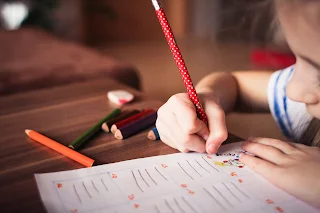Can
health and climate be related? When we hear about the climate, we think it is
just warming of the earth.
However,
there are consequences on health and economics if climate changes due to the
warming off the earth.
 |
| Add caption |
If the
temperature rises, infants will face the malnutrition and the prices of food
prices.
What
makes us say that the Climate change will turn more children into the trap of malnutrition?
The Lancet Countdown on Health and Climate Change provides an yearly analysis and this year the report has said that,
‘As temperatures rise, infants will bear the greatest burden of malnutrition and rising food prices.
The
average yield potential of maize and rice has declined almost 2% in India since
the 1960s, with malnutrition already responsible for two-thirds of under-5
deaths’
According to the report, the infectious diseases will rise, also, children will suffer most from the rise in infectious diseases — with climatic suitability for the Vibrio bacteria that cause cholera rising 3% a year in India since the early 1980s, the study warns.
Countries
like India, with its huge population and high rates of healthcare inequality,
poverty and malnutrition, few countries are likely to suffer from the health
effects of climate change.
Diarrhoeal
infections, a major cause of child mortality, will spread into new areas,
whilst deadly heatwaves, similar to the one in 2015 that killed thousands of
people in India, could soon become the norm.
Why are
children more vulnerable?
Children
are particularly vulnerable to the health risks of a changing climate. Their
bodies and immune systems are still developing, leaving them more susceptible
to disease and environmental pollutants.
Moreover,
the damage done in early childhood is persistent and pervasive, with health
consequences lasting for a lifetime.
The
report also notes that as temperatures rise, harvests will shrink — threatening
food security and driving up food prices. This will hit infants hardest.
They
would also feel deadliest impact of disease outbreaks.
Over the
past 30 years, the number of climatically suitable days for Vibrio bacteria
(that cause much of diarrhoeal disease globally) have doubled.
What is
the Lancet Countdown on Health and Climate Change?
The
Lancet Countdown on Health and Climate Change’ is a comprehensive yearly
analysis tracking progress across 41 key indicators, demonstrating what action
to meet Paris Agreement targets — or business as usual — means for human
health.
The project
is collaboration between 120 experts from 35 institutions, including the World
Health Organisation, the World Bank, University College London, and the
Tsinghua University in Beijing.
What the
Indian government been doing?
Over the past two decades, the Government of
India has launched many initiatives and programmes to address a variety of
diseases and risk factors.
But this report shows that the public health gains
achieved over the past 50 years could soon be reversed by the changing climate.
For the
world to meet its UN climate goals and protect the health of the next
generation, the energy landscape will have to change drastically, and soon, the
report warns.
Nothing
short of a 7.4% year-on-year cut in fossil CO2 emissions from 2019 to 2050 will
limit global warming to the more ambitious goal of 1.5°C.
Putting
into focus what it means for children, the report says that if the world
follows a business-as-usual pathway, with high carbon emissions and climate
change continuing at the current rate, a child born today will face a world on
average over 4˚C warmer by their 71st birthday, threatening their health at
every stage of their lives.
Without
immediate action from all countries to cut greenhouse gas emissions, gains in
wellbeing and life expectancy will be compromised, and climate change will come
to define the health of an entire generation.
Renewable energy and Solutions
But
despite the scale of the challenge, the report offers some reason for cautious
optimism, stating that the world is shifting toward using more renewable
resources.
While
India is joining the global shift towards renewable energy, it still
overwhelmingly relies on coal for electricity, with an 11% increase in its
energy from burning coal in 2016-2018, compared to less than a 1.5% rise in
China.
To
dramatically reduce emissions by 2050, and to meet multiple Sustainable
Development Goals, India must transition away from coal and towards renewable
energy.
It will
also need to enhance public transport, increase use of cleaner fuels, and
improve waste management and agricultural production practices.














No comments:
Post a Comment